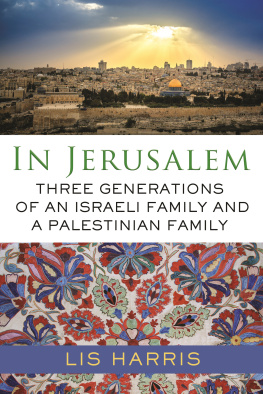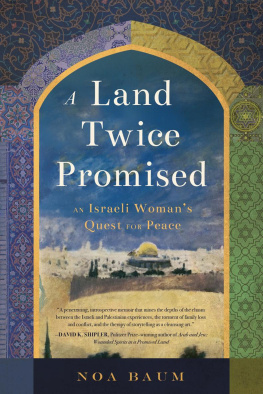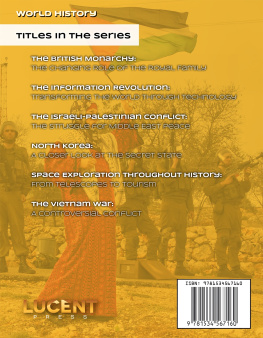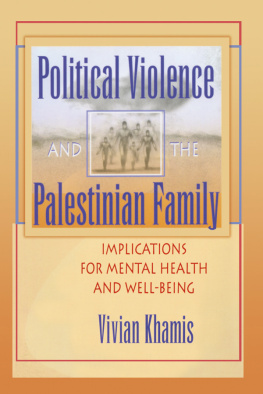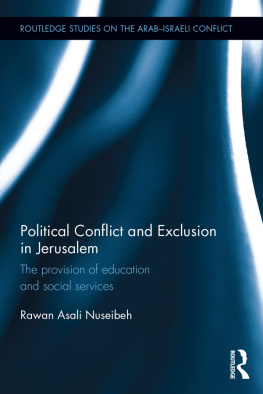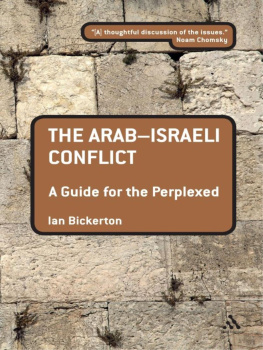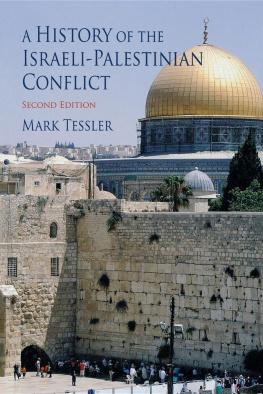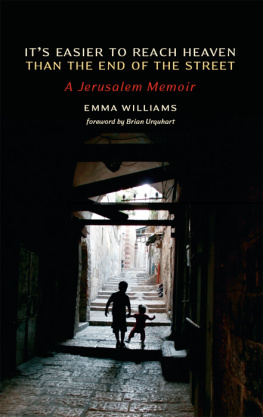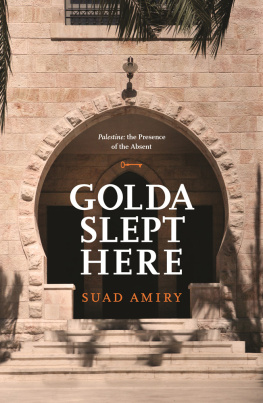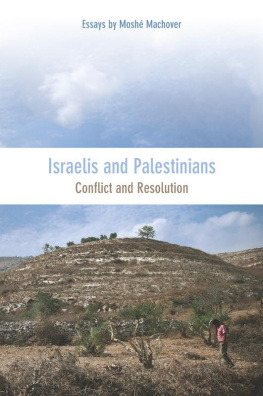Contents
Guide

To Martin
THE FAMILIES
NIVEEN ABULEILS FAMILY: THE ABULEILS AND ODEHS
| Abdallah Abuleil | Niveens father |
| Zaineb Abuleil | Niveens mother, ne Odeh |
| Niveen Abuleil | a speech pathologist |
| Mahmoud Abu Rumeileh | Niveens husband, an IT manager, Mercy Corps |
| Fatima Odeh | Niveens aunt, lives in Ramallah |
| Khaled Masalha | Khawallahs husband, a lawyer, formerly a nurse |
| Khawallah Masalha | Niveens second-oldest sister, special needs teacher |
| Layla Mashaal | Niveens aunt, lives in Ramallah |
| Maher | Niveens second-oldest brother, owner of a popular falafel shop |
| Mazin | Niveens eldest brother, a dentist |
| Monzer | Niveens brother, a lawyer |
| Muhammed | Niveens fourth-oldest brother, a civil engineer |
| Mustapha | Zainebs brother, a psychology lecturer and restauranteur |
| Nisreen | Niveens third-oldest sister, a social worker |
| Rasmea Odeh | Niveens aunt, lives in Jordan |
| Ruqaya | Niveens fourth-oldest sister, teacher of Islamic history |
| Sana | Niveens oldest sister, attended business school, runs the family household |
RUTH HACOHENS FAMILY: THE PINCZOWERS AND EZRAHIS
| Eliezar Pinczower | Ruths father |
| Esther Pinczower | Ruths mother, ne Fraenkel |
| Ruth HaCohen | a professor of musicology |
| Yaron Ezrahi | Ruths husband, a political analyst |
| Ariel Ezrahi | Ruths stepson, a lawyer |
| Christina Ezrahi | Ariels wife, a writer and dance scholar |
| Edna Pinchover | Ramis wife, principal of pediatrics, Hadassah Medical Center |
| Hannah Urbach | Eliezars sister |
| Iris Pinchover | Yehudas wife, a painter |
| Lewis Kerr | Talyas husband, a storyboard artist |
| Nechama Fraenkel | Ruths sister, a senior supervising clinical psychologist |
| Nehami HaCohen | Yotams wife, clinical psychology researcher |
| Ofra Broshi | Yarons sister, classical pianist, headed a musical conservatory |
| Rami Pinchover | Ruths older brother, a mechanical engineer |
| Sam Thrope | Tehilas husband, a journalist and Iranian studies scholar |
| Talya Ezrahi | Ruths older stepdaughter, a filmmaker |
| Tehila Ezrahi | Ruths younger stepdaughter, an artist and teacher |
| Yehuda Pinchover | Ruths second-oldest brother, a professor of mathematics |
| Yotam HaCohen | Ruths son, runs a boutique consulting firm |
PROLOGUE
A starry night in the Judean desert. Im lying on my back, cocooned in a sleeping bag, and staring up at the sky, trying to figure out a way to bring even an atom of the peacefulness of this place back to Jerusalem. It was the first of many long visits over ten years, and Jerusalem was where Id planted myself. But on this night an old acquaintance had invited me to join his family and a friend for a short camping trip on one of Israels phenomenally frequent national holidays. The excursion was an annual tradition for everyone but me, and most of the group, but especially my friend, had slightly romantic feelings about the moonlike desert landscape where we pitched camp.
Elsewhere in the desert rose the site of the fortress of Masada, the cave in Qumran where the Dead Sea Scrolls were found, the amazing St. Georges monastery carved into the crevices of the Judean hills, and the large settlement of Maale Adumim, but our rocky campsite was surrounded on all sides bynothing. It looked like a setting for a Beckett play: A cool, stony whiteness with chalky cliffs stretching into treeless, plant-less infinity. A wind so strong that my friends two strapping boys had a difficult time setting up their crazily flapping tent. Supposedly the landscape was teeming with life, particularly night creatures. There were rumors of striped hyenas and caracals, wolves, foxes, gazelles, ibexes, and hyraxessmall furry creatures that look a bit like earless rabbits and, like the many desert reptiles, use the rocks to regulate their body temperatures. But none crossed the rocky terraces and escarpments around us. Nor in the deepening twilight did we glimpse a single hawk or buzzard wheeling overhead, nor, later, any nocturnal bird making its way across the darkening sky. In a certain way, the landscape extended one aspect of Israels complex persona that seems inescapableits hardness. Particularly Jerusalems, with its hard stone walls, hard stone houses, hard marble floors, and a citizenry conflict-hardened and militarily trained to be tough.
For a while, I also tried to imagine the flight of Muhammed, who according to Islamic tradition descended across this quadrant of star-speckled sky to Jerusalem from Mecca and went back on his winged steed Buraq, and to summon forth the ancient Hebrews, Babylonians, Persians, Hasmoneans, Macedonians, Seleucids, and Romans, who, whatever disputes engaged them, like me surely gazed up appreciatively. In these imaginings, too, I had limited success.
Back in Jerusalem, with its crowded streets, malls, and high-density housing, you are all too aware of the countrys smallnessIsrael is only slightly larger than New Jersey, the fifth-smallest state in the United States. But in the long, open prospect of the desert you can easily imagine the land as a place of dreams and longingand, it goes without saying, of contention. At that point, for me, the dimensions of the conflict looked as unencompassable as the horizon.
Over the course of the evening, I peppered my companions with questions that reflected how new my encounter with the country was, though many of them had been ratcheting around in my brain for yearsespecially those that turned on the countrys rightward drift. My outsiderness stood out nakedly in this conversation, but I hoped I could eventually arrive at a useful perspective. As a secular, diaspora Jew raised by parents who werent particularly political but, to the extent that they were, were liberal, I had an intense desire to understand how the Israelis history had led the country to where they were. After a while, escaping what must have seemed like a never-ending barrage of questions, my friends friend bid goodnight to her teenage daughter, who was sitting next to her, turned definitively in her bag, and zipped herself into sleep position. An Israeli developmental psychologist, she had worked alongside Palestinian colleagues on a project about early childhood for years, she said, and everyone got along fine, and a cordial, even warm relationship prevailed. But in times of violent Israeli-Palestinian hostilities, those relationships turned frigid because no foundation of trust existed, despite their long history together, and nothing ever said at a conference or meeting or expressed in a document had ever changed that. Just before shutting her eyes, she shot me a somewhat pitying look and murmured, Wake me when the Israeli-Palestinian conflict is over.
My own upbringing in relation to the early history of the country probably didnt differ greatly from that of many other young US-born American Jewish children who grew up in the 1950s. It was a place I knew little about, and what I did know was distinctly one-sided. My earliest sense of a place called Israel bloomed largely in summer camp when I was about nine years old. Though my parents were secular Jewsto put it more precisely, flapper, lawyer (my mother) and small-town New England, factory manager (my father) Jewsthey didnt forget that they were Jewish, but their Jewishness defined them less than their Americanness. That summer my parents enrolled me in a moderately religious camp in the Berkshires, chiefly because my mothers older sister, my formidable aunt Dodo, sent her son there. Run by the same people, the girls camp was across the lake from the boys, and separate Sabbath services for girls and boys were held each weekend.

